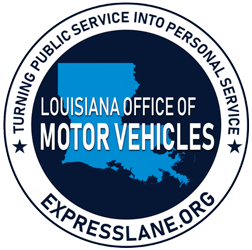Here are some of our more frequently asked questions. If you don’t see your particular question listed below, you can call us at (225) 347-5767 or ask your question on our Contact page.
Vehicles
Your old plate has been cancelled. It does not have to be turned in, but you should destroy it.
To have the vehicle transferred to a new owner, you must first determine how the estate has been settled by the heirs.
If a succession was opened through the courts, you must submit a certified copy of the final judgment of possession, showing the disposition of the vehicle.
If the heirs filed a small succession through the Department Of Revenue, you must submit the validated “Affidavit of Small Succession”, along with the descriptive list of property, which must include a description of the vehicle in question.
If the requirements for opening a succession or the filing of a small succession cannot be met, it will be necessary for the heirs to complete an “Affidavit of Heirship.” This form must be accompanied by a photostatic copy of the death certificate. If the decedent died testate (executed a will), a copy of the will or a notarized statement of its contents relevant to vehicles must be submitted. The notarized statement must be made and signed by the one in possession of the original will.
In addition to these requirements, the following documents may be necessary:
- Vehicle Application form (DPSMV1799) for title properly executed by the recipient of the vehicle.
- Certificate of title, if available. If the issue date of the title is January 1, 1990 or later, the assignment of the title must be completed by one of the heirs and the recipient of the vehicle and notarized.
- Current certificate of registration, if available.
- Notarized bill of sale or act of donation from all heirs to the recipient of the vehicle.
- Federal odometer disclosure statement completed by the buyer and seller on vehicles within ten model years.
- If the decedent’s title reflected a lien, you must submit a satisfaction of lien written on the lienholder’s company letterhead. The letter must include name, address, and telephone number of the lienholder.
- If a lien is to be recorded in the new owner’s name, you must submit a completed UCC-1 or Security Agreement showing a full description of the vehicle. When a UCC instrument is submitted to record a lien, include a $15.00 recordation fee. When any other lien instrument is submitted to record a lien, include a $10.00 recordation fee.
- If the vehicle is being sold, sales tax is due based on the selling price of the vehicle. The percentage of sales tax due is determined by applicant’s domicile.
- If an heir is an out-of-state resident and the state of residence will not accept the Louisiana Affidavit of Heirship, written documentation from that state indicating that the Louisiana Heirship form will not be accepted must be submitted with the file.
- All files with a date of sale on or after August 1, 2012, must include a copy of the vehicle owner’s current and valid photo identification. The photo identification provided should be a driver’s license or identification card issued by this state, another state, or by the United States military.
When, as a result of an insurance settlement, a motor vehicle is declared to be a total loss, the insurance company, its authorized agent or the vehicle owner must apply for a salvage title within thirty (30) days from the settlement of the property damage claim. A salvage title is issued in the name of the insurance company, its authorized agent or vehicle owner who may dismantle, sell, rebuild or restore the salvaged vehicle.
The following items must be submitted before a salvage title can be issued:
- A completed Vehicle Application form (DPSMV1799) with the words “Salvage Title” written across the face of the application.
- The properly assigned title or manufacturer’s statement of origin with the words “Salvage Title” written across the face of title or statement of origin.
- A copy of the proof of loss from the insurance company.
- A UCC-1 financing statement or security agreement to record lien (if applicable).
- A notarized authorization from the insurance company naming the agent and including a complete description of the vehicle (model year, make, body style and complete vehicle identification number of the vehicle), if the vehicle is being titled in the name of the insurance company’s authorized agent’s name.
- Disclosure of salvage vehicle form.
- If a lien is to be recorded, you must submit a completed UCC-1 or Security Agreement showing a full description of the vehicle. When a UCC instrument is submitted to record a lien, include a $15.00 recordation fee. When any other lien instrument is submitted to record a lien, include a $10.00 recordation fee.
- A Vehicle Application form (DPSMV1799) must be completed and signed by the applicant.
- The current certificate of title must be submitted with the assignment completed and notarized, if applicable.
- If a lien was recorded, it must be properly released.
- Vehicles less than ten years old must have the federal odometer disclosure completed on the title, otherwise, a separate odometer statement must be submitted.
- The notarized bill of sale or invoice with the full description of the vehicle must be submitted if the title assignment does not reflect the date of sale, selling price, and buyer/seller signatures.
- Original or a copy of the financing statement or security agreement must be included if a lien is to be recorded.
- All files with a date of sale on or after August 1, 2012, must include a copy of the vehicle owner’s current and valid photo identification. The photo identification provided should be a driver’s license or identification card issued by this state, another state, or by the United States military.
- Proof of liability insurance coverage is required, unless the vehicle was purchased from a dealer.
The following additional documents will be required, along with the above, when the vehicle was purchased from an individual out of state.
- If neither the bill of sale nor the assignment of title is notarized out of state, a notarized affidavit is required from the out of state registered owner attesting to the fact that they are not a resident of Louisiana, or a copy of the seller’s out-of-state driver’s license (front and back) must be submitted.
- If the documentation submitted was notarized in Louisiana, and no residency documents are included in the file, it can then be assumed that the registered owner shown on the out-of-state title has become a resident of Louisiana and must pay use tax. A “double transfer” will then be processed with tax collected on both transactions.
Complete an OMV Request for Duplicate Title before a Notary Public and return it to OMV by mail or in person. A duplicate title will be issued and returned to you by mail within 1-2 weeks.
Yes! You may donate movable or immovable property by Act of Donation which can be prepared by a Notary Public.
Notary
Using an experienced, commissioned Louisiana Notary Public can be an extremely cost-effective and wonderfully convenient alternative for legal document preparation and execution. Many Notary Publics (myself included) provide “after-hour” and weekend services to accommodate your busy schedule. In addition, many notaries will provide their services in the comfort and convenience of YOUR home or office.
YES! The Louisiana Notary, a civil law notary, has broad powers usually reserved for attorneys in other states. A Notary can draft, prepare, and execute affidavits, acknowledgements, and authentic acts.
A will can do many things. The most important thing a will can do is change the people who inherit your estate in the absence of a will. In the absence of a will, your property will be distributed in accordance with Louisiana “Intestate” (which means to die without a will) Law. A will can also do other things. For example, a will can:
- Name a guardian (called a tutor in Louisiana) for minor children;
- Create a trust for grandchildren, special needs heirs, or spendthrift heirs;
- Make provisions to save estate taxes for larger estates; and,
- Name an executor to collect the assets of your estate, pay any bills due, and distribute your estate to your heirs.
If none of this is important, then you may not need a will.
The Louisiana Health Care Power of Attorney allows you to designate an agent to make all decisions about your health care if you are unable to make these decisions yourself. This applies to all health care decisions for any and all types of medical conditions. These can include healthcare decisions concerning surgery, medical expenses, nursing home residency, and medication administration.
You may appoint any competent person of legal age to be your agent. You should make sure the person you select understands your wishes and is comfortable accepting the responsibility. Your agent may be a family member, close friend, or advisor you trust to make serious decisions on your behalf.
The Louisiana Health Care POA cannot be used to allow someone to make financial decisions on your behalf and does not apply to any financial or property decisions for you. There are alternative (general and specific) powers of attorney for that purpose.
IMMEDIATELY! Once you sign your Will or Power of Attorney before two witnesses and a Notary Public, it is automatically in full force and effect.
Yes, in proper person. A Notary Public can draw up the paperwork for you to sign and have signed by the other party, then you may file it in Family Court yourself.








